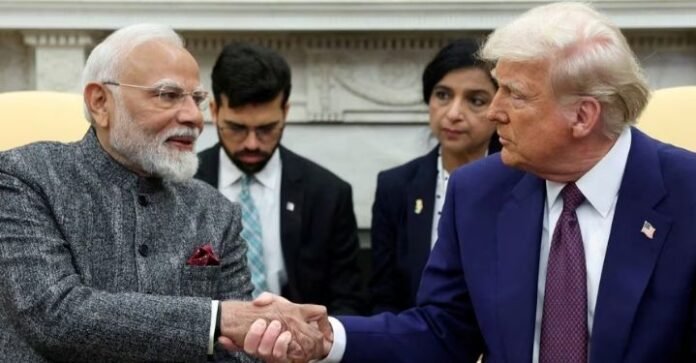India has categorically rejected recent claims by former U.S. President Donald Trump that Prime Minister Narendra Modi has promised to stop importing Russian oil. In a clear and firm response, the Indian Ministry of External Affairs denied that any such discussion had taken place, asserting India’s right to make independent decisions regarding its energy policy.
The incident, which has triggered political reverberations in both Washington and New Delhi, underscores the delicate balance India is trying to maintain: securing affordable energy while navigating complex global geopolitical tensions, especially regarding the Russia-Ukraine war.
Trump’s Claim: A Surprising Assertion
While addressing the press on October 15, 2025, Donald Trump stated that India, under Prime Minister Modi’s leadership, would stop purchasing oil from Russia. “I spoke with Prime Minister Modi, and he assured me India would phase out Russian oil very soon,” Trump claimed during a campaign stop in Ohio. He described this as a “major diplomatic win” and credited his pressure tactics for India’s supposed shift.
The remarks were widely circulated by U.S. and international media outlets, sparking speculation about a dramatic change in India’s foreign policy and energy strategy. However, it didn’t take long for New Delhi to respond.
India’s Sharp Denial: No Call, No Commitment
India’s Ministry of External Affairs issued a formal statement clarifying that no such commitment had been made. MEA spokesperson Randhir Jaiswal said, “There was no telephone conversation between Prime Minister Modi and President Trump on the date mentioned. India continues to pursue its own energy security strategy based on national interest.”
This marks one of the rare occasions where India has directly contradicted statements made by a senior U.S. political figure, indicating the seriousness with which the government views the claim.
The Bigger Picture: India’s Energy Imperative
India is currently the world’s third-largest oil importer, with over 85% of its crude needs met through foreign suppliers. Since 2022, India has increased its oil imports from Russia significantly, capitalizing on discounted prices amid Western sanctions on Moscow following the invasion of Ukraine.
Russian crude now accounts for more than a third of India’s total oil imports, a figure that was nearly negligible before the war. These purchases have helped India keep domestic fuel prices in check and manage inflation, especially in a period marked by global economic volatility.
For India, energy is not just a matter of economics but of national security. “India’s oil purchase decisions are guided solely by energy security considerations. We engage with all global partners, and decisions are made based on the best interests of our people,” said a senior Indian official who requested anonymity.
Strategic Autonomy vs. External Pressure
The Trump-era U.S.–India relationship was publicly warm, with Modi famously declaring, “Ab ki baar, Trump sarkar” during a 2019 event in Houston. However, under the surface, tensions on trade and foreign policy were often simmering.
In recent months, Trump—now campaigning for a second term—has renewed criticism of India’s continued energy ties with Russia. His administration has threatened punitive tariffs on Indian exports and raised concerns that India’s oil payments are helping to fund the Russian war machine.
But Indian policymakers have stood firm, invoking the principle of “strategic autonomy”—the idea that India will not align blindly with any global power bloc. This principle, rooted in India’s post-colonial diplomatic philosophy, remains a cornerstone of its foreign policy.
Domestic Fallout in India: Opposition Pounces
The controversy also sparked a political war of words within India. Opposition leader Rahul Gandhi criticized the Modi government for allowing international figures to misrepresent India’s stance without immediate correction. “Is our foreign policy so weak that others speak for us?” Gandhi said at a press conference in New Delhi.
Several opposition parties demanded that the Prime Minister directly address the nation and clarify the country’s position. They accused the Modi government of either failing to stand up to Trump or of secretly negotiating under pressure—both scenarios being politically damaging.
However, government sources maintained that India’s stance had been consistent throughout and that no diplomatic embarrassment had occurred, as the MEA had acted quickly to set the record straight.
Geopolitical Implications: Washington’s Tightrope
From Washington’s perspective, India’s continued oil purchases from Russia represent a weak link in the Western sanctions regime. The United States and European allies have been working to isolate Russia economically since the Ukraine war began. However, countries like India and China have largely resisted joining this campaign fully.
While the U.S. understands India’s energy needs, it has increasingly used both incentives and pressure tactics to bring New Delhi into alignment. Trump’s recent claim could be seen as an attempt to claim diplomatic credit and project strength, particularly to American voters ahead of the 2026 midterm elections.
Yet such statements, when they backfire, risk straining one of Washington’s most important bilateral relationships in Asia.
What’s Next?
As the story develops, several questions remain unresolved:
- Will India eventually scale back Russian oil imports?
Some industry reports suggest Indian refiners are slowly diversifying away from Russian crude as logistics and payment difficulties mount. But a complete exit seems unlikely in the near term. - Could this strain India-U.S. ties?
While the relationship is broad-based—spanning defense, technology, and trade—episodes like this introduce friction. Indian diplomats will likely work behind the scenes to prevent long-term damage. - Does this weaken Trump’s diplomatic credibility?
Being publicly contradicted by a major ally could raise questions about Trump’s reliability, both at home and abroad. It may also complicate future interactions if he returns to the presidency.
Conclusion
India’s rejection of Trump’s claim is more than a diplomatic footnote—it’s a reminder of New Delhi’s commitment to policy independence in an increasingly polarized world. With energy security on the line and a complex web of global partnerships at play, India appears unwilling to let outside narratives dictate its decisions.

